- Home
- Patricia MacLachlan
Journey Page 3
Journey Read online
Page 3
“What?”
“Why did Mama do it? The pictures?”
Grandma shrugged.
“I can’t speak for Liddie. I never could, Journey. And it wouldn’t be fair to you if I did.”
“Then,” I said, “I’ll have to ask her when I see her.”
Grandma looked at me, a quick look. She reached out to smooth my hair.
“I hope you get to do that, Journey. I really do.”
Grandma went to the dresser and picked up her flute.
“He shouldn’t have told me,” I said suddenly. “Grandfather shouldn’t have told me about the pictures.”
“But, Journey,” Grandma said softly, “you asked him.” Grandma paused for a moment to look at the old picture of Mama that leaned against the dresser.
“Funny, isn’t it, how we are sometimes angry at the wrong person.”
She gave her head a little shake, as if shaking off a fly, then she went out the door.
“You,” I whispered to the picture. “I could have a sore throat. I could have a temperature.”
I leaned my elbows on the dresser and peered into Mama’s face.
“Do you hear me?”
Chapter Seven
And then the cat came. After the rains, when Grandfather and I were silent and uneasy with each other, and the lawn grew too long, and June bugs threw themselves against the lamplit screens, I heard the soft thump as the cat jumped up to my sill. The cat stared at me, its face like a pansy, and then, without claws, it lifted a paw and hit the window screen. The tiniest of sounds. Very carefully I lifted the screen, and the cat walked inside, across my desk, and settled on my bed as if it were home. As if the cat were someone come back in disguise. Almost at once the cat slept.
Slowly I backed out of the room, racing to the kitchen.
“Cat?”
Grandma looked up.
“Your sister’s not here, Journey. Do you want something?”
No. I knew how Grandma felt about cats.
Behind her, Grandfather was standing, leaning against the counter, stirring coffee.
“No, Grandma, thanks. Good night.”
“Good night then,” said Grandma, threading a needle in the light.
I looked at Grandfather, and he looked back at me, taking a sip of his coffee, his eyes narrowed against the steam. He turned his head to one side, as if he were getting a different view of me. I lifted my shoulders, took a breath, and beckoned to him, putting a finger to my lips. His eyebrows rose. After a moment he put down his coffee, silently following me down the hallway to my room.
“What is it?” he said at my bedroom door.
“Look,” I whispered, pulling his arm. I pointed.
“Oh, my,” whispered Grandfather. He smiled. “Look at that, ail tuckered out.”
Slowly he walked to the bed. The cat stretched, looked up at him, then curled up again.
“Whose cat is it?” asked Grandfather.
I was silent.
Grandfather quickly looked down at me.
“Journey,” he warned, “no. You know your grandma is not fond of cats. She loves her birds.”
“I love this cat,” I said. “He tapped on my window screen. I think he’s mine.”
“Do not,” said Grandfather, whispering fiercely, “do not name this cat.”
I knew the family rule. Do not name an animal or you’ll have to take care of it. If you name it, it’s yours.
“He tapped on my screen and walked right in and went to sleep,” I went on, “just like he lives here. And he does.”
I put out my hand and stroked the cat, and he put his paws around my hand, hugging me to him.
“See?” I whispered.
Grandfather bent down.
“There’s blood here, Journey. See, a little trail on the floor.”
Grandfather ran his hands over the cat, who peered at him through slit eyes.
“Here it is. A little cut on his foot.”
Grandfather took out his handkerchief and blotted the cat’s left paw. Suddenly the cat reached over and took Grandfather’s finger in his teeth. I held my breath as Grandfather and the cat stared at each other. After a moment Grandfather smiled.
“You are something,” he said to the cat, and to prove it, the cat let go of his finger, turned over, and went back to sleep.
“What is going on here?”
Grandma’s voice made Grandfather jump. The cat didn’t move.
“Oh, for heaven’s sake, Marcus!”
My sister appeared suddenly behind Grandma. Her face lighted up when she saw the cat.
“Oh!” She turned to me. “Have you named him yet?”
“Marcus!” said Grandma warningly, her lips pressed tightly together.
“Now, Lottie,” said Grandfather, “this is an injured animal. We have to be humane here.”
“You know how I feel about cats,” said Grandma. “And cats are not humane to birds.”
“We’ll put a bell on him,” I said. “Two bells, Grandma! Please!” Grandma’s face was stern. I turned to Grandfather. “I need this cat.”
My own words startled me, and Grandfather cleared his throat.
“Actually, Lottie, it’s unfortunate, I know, hut Journey has named him already.”
I stared at Grandfather. Grandma saw my surprise.
“Really,” she said, folding her arms across her chest. “And what would that name be?”
“Yes,” said Grandfather. His eyes roamed the room. “His name is …” Grandfather looked at the vase of peonies by the window. “His name is Bloom, isn’t that what you called him, Journey?”
“Yes.” I nodded.
“Oh, push,” said Grandma, half smiling, “you just made that up, old man. You might just as well have said Peony.”
“Lottie,” said Grandfather, “Journey knows that Peony is no name for a cat.”
The screen opened, and Cooper poked his head in.
“I saw the lights.”
He climbed in, closing the screen behind him, and then he saw the cat. Cooper peered at Grandfather, at my sister leaning against the wall, and at Grandma with her arms still folded. Finally he looked at me.
“Of course you named him,” he said, making Grandfather’s lips twitch.
“Bloom,” I said.
“I’ll get the camera,” said Grandfather.
* * *
As it turned out the name Bloom fit the cat well. In Grandma’s words, Bloom was about to burst into flower. In Grandfather’s words, “He’s a she, she’s pregnant. You’re going to be a papa.”
Grandma pretended anger at the idea of more than one cat. But I thought that she’d known the moment she first saw Bloom. And Bloom, if she loved anyone, loved Grandma. She ran to her in the morning with a small, eager sound of welcome. She brought sodden and well-chewed mice to the doorstep, waiting proudly for Grandma to run through all her words of disgust. She sat beside Grandma on the living room couch at night, watching Grandma closely.
We tied a bell on Bloom so she wouldn’t catch birds, but Bloom would not wear it, managing to chew it off. Late into the night we heard the sound of Bloom batting it up and down the hallways of the house before she came to my bed to sleep. But as far as I knew, Bloom never caught a bird. If she did, she never brought it to Grandma’s doorstep.
“She knows,” said Cat admiringly.
“She’s the most intelligent cat I’ve ever known,” added Cooper, who had never known any cat well. “Intelligent enough to know your grandma would kill her and toss her on the compost heap.”
I knew better. I knew that Grandma and Bloom had a secret life of their own. Once, hidden in the pantry, I heard what Bloom heard each day from Grandma.
“Oh no, you filthy little cannibal! Take that mouse away, you wretch!” Then whispered, “You are one splendid girl. The best in all the world. Would you like a treat?”
One morning I borrowed Grandpa’s camera and stalked them in the garden, and I took a picture of Grandma leaning over the onions to w
hisper to Bloom, Bloom’s tail high, her face lifted to Grandma’s, almost a kiss.
Days later, when Grandfather saw the picture he grew very quiet, and when I looked up at him his eyes were wet. He pinned the picture on the wall of the barn, and we stood next to each other, not speaking for a long time. Then we had the shortest conversation of our lives so far. “Lottie needs that cat,” said Grandfather.
I nodded.
“The camera knows,” I said.
Chapter Eight
The days grew hot and Bloom grew fat. Humid air hung heavy as parlor drapes in the house, but still no letters came—only small packets of money with envelopes leaving a postmark path I couldn’t follow. Grandma took the fruit out of her crystal bowl in the dining room, and Bloom climbed in happily to keep cool. Grandfather groused (“She doesn’t even let me wash that bowl”), but when Grandma left he set the table with all the china and silver, candles burning, and took a picture of Bloom lolling in the bowl like a queen. Then he handed me the camera, and I took a picture of them both—Bloom in the bowl and Grandfather at the head of the table, the candle flames reflected in their eyes.
During the hot days Grandfather was seized by picture taking. He took a picture of Cat and me, up to our necks in the brook, and Cooper, his white wrinkled feet thrust up between our faces. He took Grandma in the hammock under the tulip tree, playing her flute to Bloom, above her on a branch. He made me drive the John Deere through the hayfield as he perched dangerously over the cutter, photographing the blades as they turned.
“If I fall,” he yelled over the noise of the engine, “grab the camera!”
And he maddened the chickens, trying to take a still life of eggs in the henhouse.
But it was the family pictures that consumed him and drove us into hiding. We would hear him call “Everyone!” innocently, and we would run to different parts of the house— Grandma into the pantry, closing the door after her, Cat under her bed, and me to the attic. But he always found us. Once, we posed in the doorway of the barn, nicely framed, but a chicken flew past us. Even Bloom caught the tone and would streak past us into the nearest room or behind the curtains. Or, just that once, into Mama’s room.
That’s why it was Bloom who found them. Under the bed in the room we never entered, in the room that Mama had stripped of herself, Bloom hid next to the box, waiting for us to find her.
“What is this?” said Cat, lying down next to the bed. “Come out, Bloom.”
I lay down, too, lifting the dust ruffle. Bloom batted at my hand, then jumped into a box. I reached out and pulled the box out from under, Bloom crouched down inside.
Behind us was a noise. Grandfather held Grandma’s arm as if she were his captive.
“Come on, now, I’ve caught her. Just one picture.”
And then Bloom jumped out of the box.
And Grandfather’s face changed.
Inside the box were torn pictures, hundreds of them. Bits and pieces of faces and arms and bodies; slices of scenes, of sky and flowers; a door, a porch here; the barn, the face of a cow peering over the fence. A baby’s hand.
I stood up. Grandma put her hand on my shoulder.
“She didn’t throw them away,” I said, my voice a whisper.
“Doesn’t look like it,” said Grandfather stiffly.
He exchanged a look with Grandma.
“Well,” said Cat, getting up and dusting off her pants. “She sure did in our family. Didn’t she?”
No one spoke. Then Cat looked up at Grandfather and Grandma. “It looks like murder to me.”
Murder. The word washed over me. It did look like a killing. Cat was right. Inside that box were people: Cat and Mama and Papa. And me. Was that baby’s hand my hand?
I picked up the box and looked at Cat. Her face was pale. Tears sat at the corners of her eyes.
“I’ll fix this, Cat,” I said to her. “I’ll tape these pictures back together again.”
“Oh, Journey,” began Grandma.
But Grandfather stopped her.
“It’s all right, Lottie. Journey’s got a right to these pictures.”
He reached into the box and cradled a handful of torn pictures in his hand. Pieces slipped through his fingers like water.
“It’s Journey’s past,” he said.
* * *
Morning has come and gone, and afternoon, too. A standing lamp shines down, a yellow pool on the pictures. Faces stare up at me, and a dog I don’t remember or I’ve forgotten, and Cat’s face when she was seven or eight. But it is the baby’s hand. Where is the face? And where is the picture of the man who holds him?
For a long time I work alone, sorting and shifting picture pieces like a giant puzzle. But I can piece together only a few. Not the ones I want. Cat comes to crouch down, but she only looks. Grandma comes to bring me dinner on a plate, and later Grandfather stands above me so he won’t cast a shadow. He leans down for a moment, picking up a piece, then putting it back. Then, without a sound, he is gone.
There is moonlight at the windows when something, a movement in the room, startles me. Bloom walks across the pictures, and I look up and Cooper is sitting in a chair by the window. He is wearing a strange cowboy hat, too small, that sits high on his head. We stare at each other.
“Cooper,” I say, my voice soft, “I will put all these pictures back together, and everything will be all right.”
Cooper is silent. I look up at him.
“It will,” I say. “It will,” I whisper.
Chapter Nine
I am dreaming. I always know when I am dreaming because I can fly. I fly over the farm, over the blueberry barren, over the barn and house. I fly over Grandfather in the field, and when I call down to him he raises his camera and takes a picture of me with my wings all warm. Then I fly down a road. The road turns into a map, and the map is large with all the roads marked, and I follow all the towns one by one by one. When I try to call down again, my voice has changed to a bird’s voice. And no one looks up.
I woke, sweating, with early light coming in the window. I sat up, looking over to the chair in the corner, and then I remembered that Cooper had left, long ago. Long ago, after we had worked, and Cooper had sat back suddenly and told me that it was impossible. That was the word he used, impossible. That I couldn’t patch all the pictures together because there were so many; more than I had thought. Look, he had said to me, some of these pictures are very old; here is part of your grandmother’s face when she was very little. Like the picture in the swing. Remember?
My grandma’s face. She had even torn up my grandma.
And I told Cooper his cowboy hat looked stupid.
And he left.
And I knew Mama was never coming back. I got up and looked out the window. Cooper’s bike leaned against the house, and I half expected to see him there, too, but I knew he had walked home alone through the fields in the dark.
Behind me the lamp was still on, its pale yellow light spilling out over the pictures. I bent down and picked up the pieces, trying not to look at the faces of the people as I filled the box and put it in my closet. Bloom appeared to rub her face against my arm. With a small sound, she jumped into the box and lay there, looking up at me through tired eyes.
“The box is yours, Bloom,” I said. “You found it, after all.”
And I climbed out the window, very quietly so as not to wake anyone, and began to pedal Cooper’s bicycle down the road to his house. I didn’t get very far when I began to cry.
* * *
Cooper’s house was white clapboard with a cement sidewalk, his mother’s narrow lines of alternating white petunias and red salvia on either side. I thought of Grandma’s growing garden of flowers and vegetables, getting larger as the days passed. Cooper’s mother didn’t like to garden.
“If God had wanted us to garden, he would have had plots all dug up, waiting for us. And he wouldn’t have created weeds, either,” she once said.
I wheeled the bicycle up the walk. I was not surp
rised to see Cooper sitting on the front porch in a white metal chair. I was not surprised, either, that he still wore his cowboy hat.
“Thanks for bringing my bike,” he said.
“I’m sorry. What I said about your hat,” I told him.
Cooper nodded. I sat down next to him.
We looked out over the neat yard.
“You been crying?” asked Cooper, not looking at me.
“Yes.”
After a moment Cooper shrugged his shoulders like Grandfather.
“Well, then,” he said, “let’s go in. Mrs. MacDougal is making breakfast.”
Cooper called his mother Mrs. MacDougal. So did Mr. MacDougal. I expected that one day soon Emmett would ask for his bottle please, Mrs. MacDougal.
In the kitchen Cooper’s mother was making pancakes. Emmett sat in his high chair, smears of banana and applesauce across his face and up his arms to his elbows. His hair was stuck to his scalp with pancake syrup. Food lined the creases of his neck like putty.
“He’s learning to feed himself,” explained Mrs. MacDougal, putting a plate in front of me. “You’ll have some breakfast, Journey?”
Emmett grinned at me, banana oozing around his two front teeth.
“Just a little, please,” I said, and Cooper laughed.
“Mr. MacDougal!” called Cooper’s mother.
“I’ve eaten, Mrs. MacDougal!” answered Cooper’s father from upstairs. But soon he exploded into the room in his work clothes and kissed Emmett, then Cooper, then Mrs. MacDougal, then me. I was startled, trying to remember the last time someone had kissed me. The kiss was warm on my forehead, and I bent my head down to finish my pancake.
Cooper’s house was filled with MacDougals—pictures on the refrigerator and above the doorway. After we ate I followed Cooper into the dining room, where his great-grandparents hung over the sideboard. In the living room were pictures of Cooper as a baby, plump as a plum; Mr. and Mrs. MacDougal before they were married; and newer pictures of Emmett, all cleaned up and looking wise. I walked from room to room with Cooper, watching his life on the walls.
“Grandfather says pictures show us the truth sometimes,” I said.

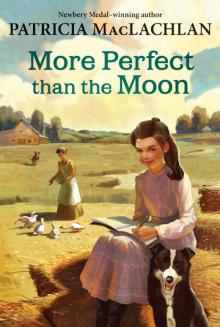 More Perfect Than the Moon
More Perfect Than the Moon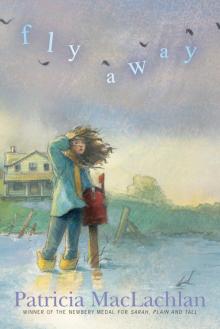 Fly Away
Fly Away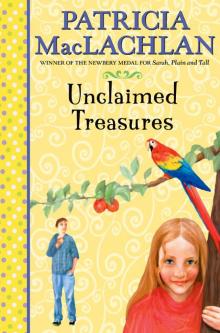 Unclaimed Treasures
Unclaimed Treasures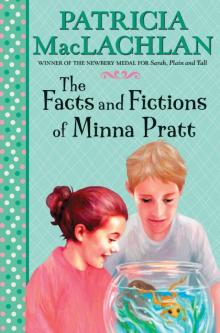 The Facts and Fictions of Minna Pratt
The Facts and Fictions of Minna Pratt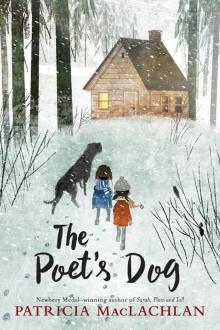 The Poet's Dog
The Poet's Dog Journey
Journey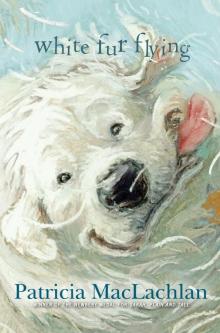 White Fur Flying
White Fur Flying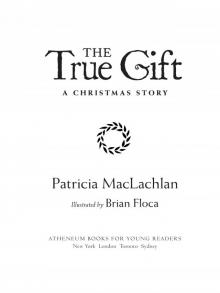 The True Gift: A Christmas Story
The True Gift: A Christmas Story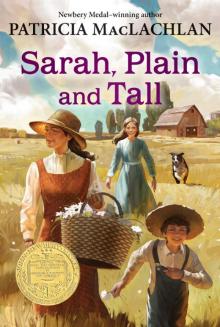 Sarah, Plain and Tall
Sarah, Plain and Tall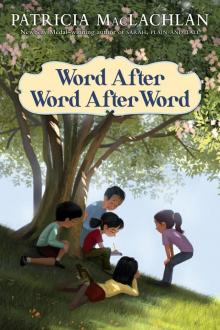 Word After Word After Word
Word After Word After Word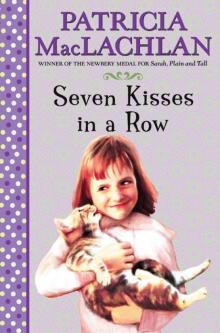 Seven Kisses in a Row
Seven Kisses in a Row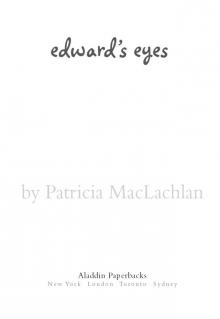 Edward's Eyes
Edward's Eyes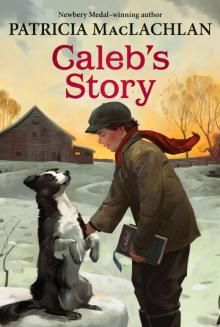 Caleb's Story
Caleb's Story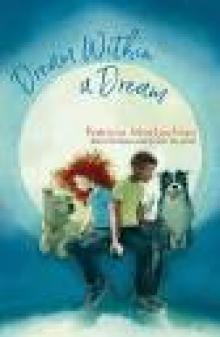 Dream Within a Dream
Dream Within a Dream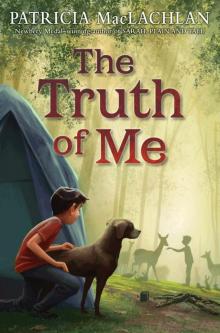 The Truth of Me
The Truth of Me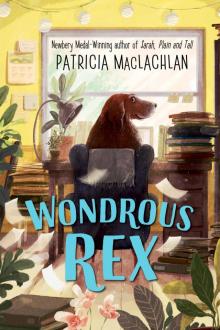 Wondrous Rex
Wondrous Rex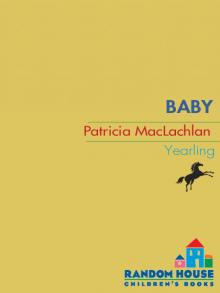 Baby
Baby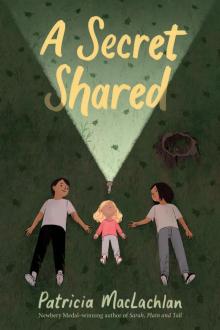 A Secret Shared
A Secret Shared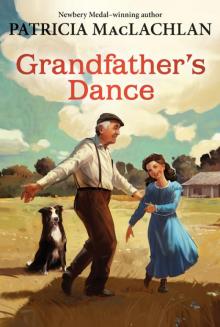 Grandfather's Dance
Grandfather's Dance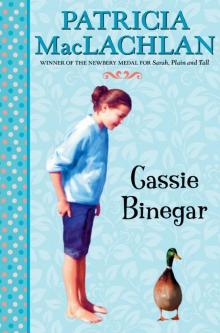 Cassie Binegar
Cassie Binegar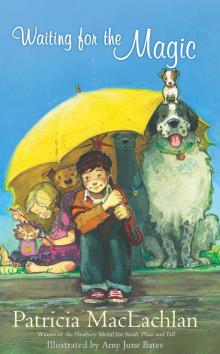 Waiting for the Magic
Waiting for the Magic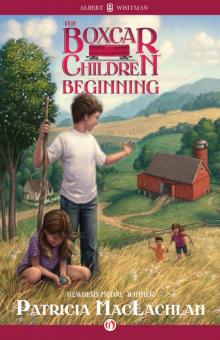 The Boxcar Children Beginning
The Boxcar Children Beginning My Father's Words
My Father's Words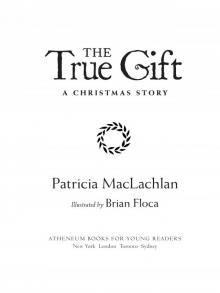 The True Gift
The True Gift